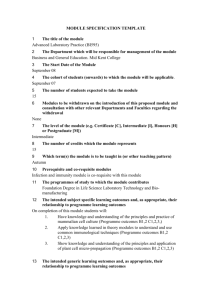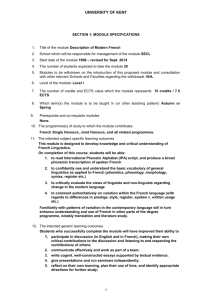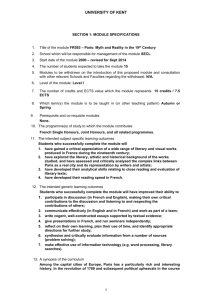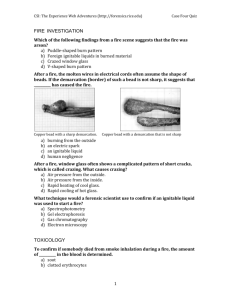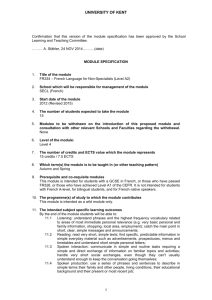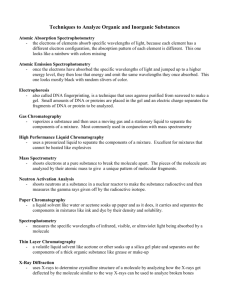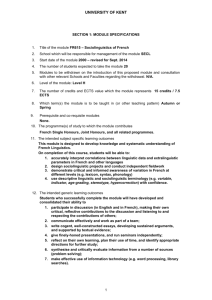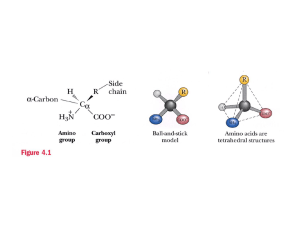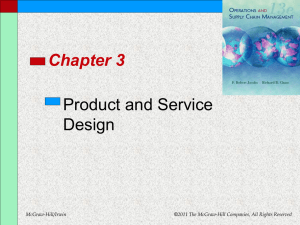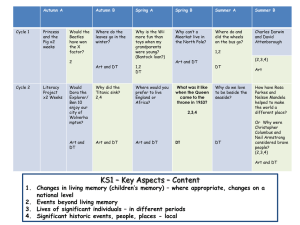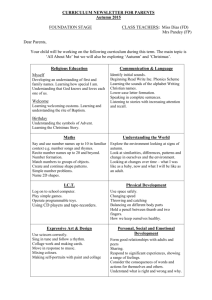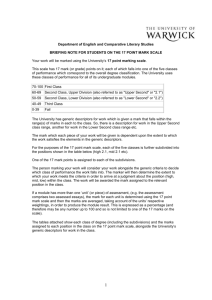MODULE SPECIFICATION TEMPLATE
advertisement
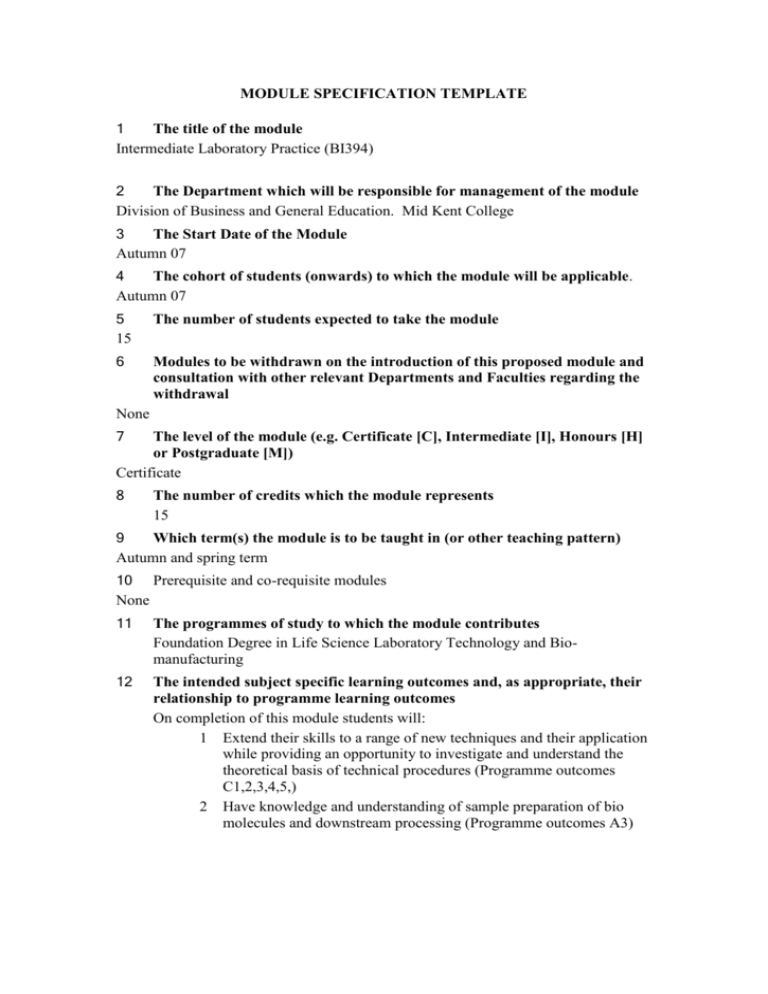
MODULE SPECIFICATION TEMPLATE 1 The title of the module Intermediate Laboratory Practice (BI394) 2 The Department which will be responsible for management of the module Division of Business and General Education. Mid Kent College 3 The Start Date of the Module Autumn 07 4 The cohort of students (onwards) to which the module will be applicable. Autumn 07 5 The number of students expected to take the module 15 6 Modules to be withdrawn on the introduction of this proposed module and consultation with other relevant Departments and Faculties regarding the withdrawal None 7 The level of the module (e.g. Certificate [C], Intermediate [I], Honours [H] or Postgraduate [M]) Certificate 8 The number of credits which the module represents 15 9 Which term(s) the module is to be taught in (or other teaching pattern) Autumn and spring term 10 Prerequisite and co-requisite modules None 11 The programmes of study to which the module contributes Foundation Degree in Life Science Laboratory Technology and Biomanufacturing 12 The intended subject specific learning outcomes and, as appropriate, their relationship to programme learning outcomes On completion of this module students will: 1 Extend their skills to a range of new techniques and their application while providing an opportunity to investigate and understand the theoretical basis of technical procedures (Programme outcomes C1,2,3,4,5,) 2 Have knowledge and understanding of sample preparation of bio molecules and downstream processing (Programme outcomes A3) 13 The intended generic learning outcomes and, as appropriate, their relationship to programme learning outcomes 1. Develop practical skills (Programme outcomes A 1, 3 B4, 6 D3, 4, 6) 2. Link practice to theory including historical development of techniques (Programme outcomes A 2, 5 B1, 2) 3. Analyse, evaluate and communicate data gathered from practical investigations (Programme outcomes B3, 5 D1, 9) 4. To enable students to develop key employability skills (Programme outcome D10) 14 A synopsis of the curriculum Lectures: Topics covered in lectures: 1. Measurement of concentration to the appropriate degree of accuracy. Percentage – mass/volume, mass/mass, molar mass, moles. 2. Theory of a range of techniques, such as pH, colorimetric, uv/vis spectrophotometry, flame photometry, atomic absorption spectrophotometry, paper and thin layer chromatography, gas chromatography, high performance liquid chromatography, infra-red spectrophotometry, gel electrophoresis, ion exchange and gel filtration 3. Use of techniques, including filtration, reflux, distillation, centrifugation Practicals Students will have practical classes to use the techniques listed above in order to consolidate their learning of the theoretical and practical applications of each method. Some practical classes will be conducted in the format of a work simulation. Students will be expected to demonstrate knowledge and application of the principles of good laboratory practice and standard work flow and their relevance to quality assurance in the work place. 15 Indicative Reading List Fischbach F.T. (1999) Manual of Laboratory Diagnostic Test. Lippincott Williams and Wilkins ISBN 0781719690 Smart L. (ed.) (2002) Separation, Purification and Identification. Royal Society of Chemistry. ISBN 0854046852 Zubrick W.J. (1999) The Organic Chemistry Laboratory Survival Manual: A student’s guide to Techniques. John Wiley and Sons ISBN 0471129488 16 Learning and Teaching Methods, including the nature and number of contact hours and the total study hours which will be expected of students, and how these relate to achievement of the intended learning outcomes The teaching and learning strategies are designed to enable students to further develop their theoretical understanding of laboratory technology, and practice the skills needed in a responsible, safe and accurate manner. Contact and study hours. 150 hours of learning including; Lectures 30h; Practicals 40h; Computer workshops 5h; Transformation of data and use of statistics 10h, Self study, practical write up and data analysis, 65h. 17 Assessment methods and how these relate to testing achievement of the intended learning outcomes This module will be assessed by course work assignments only. Course assignments are set throughout the module so that students obtain feedback on their learning and skills and improve their laboratory work throughout the module. The overall marks will be allocated as follows: Practical write up reports (including at least one report of a work simulation exercise): 25% (subject specific outcomes 1,2 and generic outcomes 1,3,4) In class test: 25% (subject specific outcomes 2 and generic outcomes 2,3) Data treatment exercise: 25% (subject specific outcomes 1,2 and generic outcomes 3,4) Oral presentation: 25% (subject specific outcomes 1,2 and generic outcomes 3,4) 18 Implications for learning resources, including staff, library, IT and space The module will be taught at the Kent Science Resource Centre which will have modern well equipped laboratories, and purpose built teaching facilities. Students will be expected to have access to IT equipment (computer). Some materials will be available on-line 19 A statement confirming that, as far as can be reasonably anticipated, the curriculum, learning and teaching methods and forms of assessment do not present any non-justifiable disadvantage to students with disabilities As far as can be reasonably anticipated the curriculum, learning and teaching methods and forms of assessment do not present any justifiable disadvantage to students with disabilities If the module is part of a programme in an Associate College, please complete the following: 20. Associate College: Mid Kent College OF H & Fe 21. University Department (for cognate programmes) or Faculty (for noncognate programmes) responsible for the programme: Biosciences
